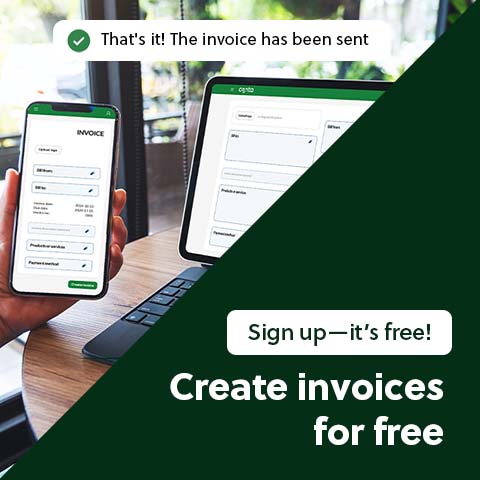It’s important to manage and keep track of business expenses so that you can budget accurately, pay the right amount of taxes and make informed business decisions. This article explains how to do it.
If you don’t keep track of your business expenses, your finances can quickly get out of control. Whether you work as a freelancer or run a small startup, keeping track of expenses helps you with your budget, taxes, and business decision.
Keeping track of business expenses will make a huge difference when it comes to bookkeeping and tax filing at the end of the financial year.
Let’s take a look at the top 10 tips to help you manage your business expenses.
1. Make a budget
The first step in managing business expenses is to create a detailed budget. A budget outlines what you expect to earn and to spend over a period of time.
It can be hard to create a budget when you first start a business, since you don’t know yet what you’re likely to earn and spend. In that case, you should do your best to make an educated guess, and then adjust your budget as you go.
In fact, it’s important to regularly review the budget to ensure that your costs are aligned with your business goals and with what you’re actually earning and spending. You can download a free budget template to get started!
See also: Running a business? How to set up a budget
2. Use accounting software
Accounting software is essential to keep track of business expenses. Doing your bookkeeping in Excel is difficult and takes a lot longer.
Modern accounting tools, like QuickBooks, Xero, or FreshBooks, automate many of the tasks for you, and help you do it correctly. You can organise expenses, generate financial reports, and even integrate with your bank accounts for easier bookkeeping.
Pro tip: Invoice software speeds up the process
If you use invoice software to create and manage your invoices, bookkeeping becomes much easier.
Professional invoices will include everything you need to get paid on time and to track your income Conta is a completely free invoice software for freelancers, contractors, small businesses and startups. There’s no limit to how many invoices you can create.
3. Set up a separate bank accounts
It’s important to separate your personal and your business finances. Opening a dedicated business bank account and using a business credit card, ensures that all business transactions are collected in one place. This simplifies your bookkeeping, since you don’t have to go through a bunch of personal receipts and bank statements, and helps you remember to claim tax deductions for all your business expenses.
4. Track expenses in real-time
Tracking expenses as you go means you won’t loose receipts and invoices, which you need to claim tax deductions. You can even use mobile apps linked to your accounting software to photograph and categorize expenses on the go.
If you have employees, you should encourage them to submit receipts and expense reports immediately after a purchase.
5. Keep receipts and documentation
Make sure to store receipts, invoices, and related documents properly. Your business can get tax deductions on almost every expense, as long as you have the required documentation. Purchase documents are also crucial in order to file taxes correctly, and you’ll also have to provide these documents if you’re ever audited.
See also: Understanding tax deductions for small businesses
Many businesses store receipts electronically in order to reduce clutter, keep documents safe from theft, fire and water damage, and to be able to easily retrieve specific documents. Make sure that you regularly back up your data.

6. Implement expense policies
If you have employees, it’s important to have clear policies for business expenses in order to manage costs. The policy should define what’s considered a business expense and which type of expenses are reimbursable.
You should also set upper limits for different categories, such as travel, meals, and entertainment. Make sure that all employees understand these policies so that you can avoid unnecessary expenses.
7. Reconcile accounts regularly
Bank reconciliation is the process of checking that the transactions in your business bank account matches up with your accounting. This ensures that your financial records are accurate and complete.
If you have a small business—or you work as a freelancer or contractor—it might be enough to do it every month. However, it depends on how many transactions you have.
8. Monitor your cash flow
Managing your cash flow is key to expense tracking. Cash flow is the flow of money into your business and out of your business. Having a positive cash flow is necessary to be able to cover your costs. That’s why cash flow management is so important.
You can use a cash flow forecast and a cash flow statement to check your cash flow.
See also: Mastering cash flow management for small businesses
9. Make it easier to pay taxes
Accurately tracking your expenses makes it easier to pay the correct amount of taxes. Documenting and sorting expenses throughout the year helps you identify deductible expenses and reduces your taxable income.
10. Analyze and optimize expenses
Regularly analyzing your expenses can reveal opportunities to cut costs and spend your money where it’ll make the most difference.
To reduce costs you can negotiate with your suppliers, look for more cost-effective software and equipment, reduce waste and so on. These are all strategies that can improve your bottom line. Remember that reducing a lot of small expenses can improve the liquidity of your business.
Track your income with invoicing software
You can use free invoice software to create, send, and manage your invoices.
In the invoice software, you can see how much you’ve invoiced for and who your biggest clients are. This makes it easier to follow up on outstanding invoices so that you can get paid and improve your cash flow and liquidity.





